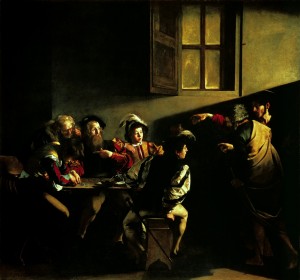The air is still, holding now the beauty that was nascent in the sublime fury of yesterday‘s blizzard. It is seven in the morning, and I’m driving to town to get bread and eggs for Christmas breakfast.
The third convenience store I come to emerges from the pre-dawn darkness with its bright lights and full shelves, and it is open! The clerk behind the counter welcomes me warmly. I find eggs and bread, buy them and then head back to the car, but not without first thanking the clerk for working on Christmas Day. I remember her smile as I drive back home along the icy country roads.
This is the darkest time of the year, yet light emerges from the darkness and not just the neon brightness of a pre-dawn, convenience store sign. True light lies nascent in the smiles of friends, loving family and hard working convenience store clerks.
Much of the time, I suppose, we say we don’t like work, yet we can find ourselves through work. Joseph Conrad wrote about this in his novel The Heart of Darkness:
No, I don’t like work. I had rather laze about and think of all the fine things that can be done. I don’t like work – no man does – but I like what is in the work, the chance to find yourself. Your own reality – for yourself, not for others – what no other man can ever know. They can only see the mere show, and never can tell what it really means.
The Catholic Church teaches about work in its encyclical Laborem Exorcens:
… in the final analysis it is always man who is the purpose of the work, whatever work it is that is done by man – even if the common scale of values rates it as the merest “service”, as the most monotonous even the most alienating work. [emphases added]
The “common scale of values” is so woefully inadequate so much of the time. For the person who gives herself to her work, which the common scale of values may say is monotonous and alienating, then that work is the light of self-discovery shining in the darkness of ignorance and control by others.
Caravaggio was a sixteenth century Italian artist who showed his subjects in light emerging from the surrounding darkness. The Calling of Saint Matthew addresses Matthew, a tax collector. The painting shows Jesus calling Matthew to self-discovery, even as Matthew practices his “most alienating work.”

Self-discovery comes through human kindness and caring that we share with each other, whether in the smile of a convenience store clerk on a cold Christmas morning, the achievement of a Nobel Prize laureate or the calling of a saint. A human person reaching out, caring for another is the light of self-discovery emerging into the world, changing even the darkness itself into a shining radiance.

